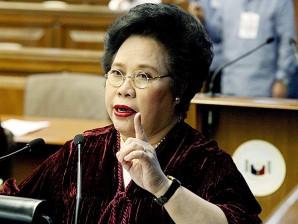Santiago cries blackmail over threats to sue for ‘mongoloid’ remark

Senator Miriam Defensor-Santiago. FILE PHOTO/SENATE POOL
MANILA, Philippines — Senator Miriam Defensor-Santiago on Wednesday slammed the members of the Down Syndrome Association of the Philippines, Inc. (DSAPI) for threatening to sue her over her statement calling her political enemies “mongoloids.”
In a letter addressed to DSAPI President Tony Pasia, Santiago said that it will be unlawful for members of the group to charge her with alleged violation of the law, R.A. No. 9442, also known as the Magna Carta for Persons with Disability (PWD) for her statement last week at a media forum.
“I tell all my enemies who just want to get off me, stop molesting me, you mongoloids!” she told reporters at the Senate, referring to her critics.
“Some in your group threaten to sue me in court. They are in danger of committing the crime of threats, also known as blackmail. (Penal Code, Article 283). If so, I would then have the right to sue them for damages, under the law penalizing any private individual who ‘obstructs, defeats, violates, or in any manner impinges or impairs,’ any person’s freedom of speech (Civil Code, Article 32, para. 2),” Santiago said in her letter.
Nevertheless, Santiago promised to “impose self-censorship” to avoid future misunderstandings.
“As a parent myself, I understand that what obviously motivates you and my other critics is parental love and concern. This being so, I extend the hand of friendship. Out of goodwill, I will impose self-censorship, by avoiding in future any word that refers to a person with disability,” Santiago said.
She clarified that her statement did not intend to malign persons with disability but said that her statement was addressed to her political opponents.
Article continues after this advertisementSantiago added that the phrase “stop molesting me, you mongoloids,” was from a Pulitzer Prize winning book, A Confederacy of Dunces by John Kennedy Toole. Santiago said that while Kennedy was alive, he was not criticized for his work and was even lauded by literary critics.
Article continues after this advertisement“It is unfair and misguided to charge me with intent to violate the law, when my intent was to emphasize my anti-graft stance. The issue is not really the law, but your group’s interpretation of the law. Without being too technical, I have to point out that the Penal Code exempts from criminal liability ‘any person who acts in the lawful exercise of a right,'” Santiago said in her letter.
Santiago said that free speech, as provided by the Constitution’s Article 3, Section 4, states “No law shall be passed abridging the freedom of speech, of expression, or of the press.”
“In constitutional law, freedom of speech occupies a preferred position. Historically considered, freedom of speech and press generally means immunity from prior restraint, also known as censorship,” Santiago said.
She added that the Magna Carta for PWDs is not a censorship law, but it seeks to prevent ridicule of PWDs.
“The Magna Carta does not seek to censor the use of the word ‘mongoloid,’ ‘autistic,’ or similar words in any public speech. That would be unconstitutional censorship,” she added.